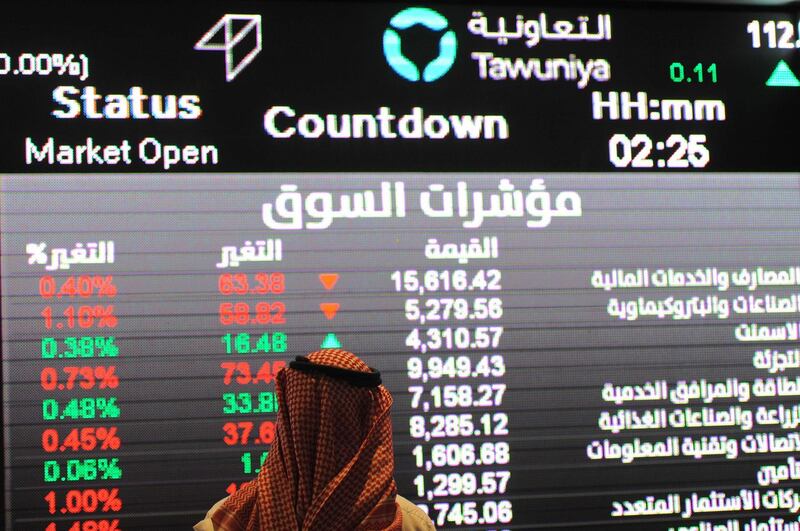EFG Hermes has revised its outlook for Saudi Arabia upwards to overweight status, ahead of the country's anticipated inclusion in the MSCI and FTSE emerging market indexes, which will generate flows of up to $45 billion into local equities, according to the investment bank's projections.
EFG Hermes expects the total return from Saudi stocks to be around 30 per cent by mid-2019 on the back of foreign inflows, boosted by increasing earnings per share and dividend growth, it said in a strategy note issued on Monday.
"We expect the [emerging market] upgrades to drive [approximately] $30 to 45bn total foreign inflows (of which $14bn would be passive) into Saudi Arabia," the bank said in a note. "Our market call is supported by an expansionary budget in 2018, which our economics team expects will lead to a gradual pick-up in economic growth from 2Q18."
In December, Saudi Arabia unveiled a 978bn Saudi riyal annual budget – its largest ever – for 2018, priming the country for economic growth following a period of fiscal tightening brought on in the wake of a three-year oil slump.
The government forecasts the country’s economy will grow by 2.7 per cent in 2018, after shrinking by 0.5 per cent in 2017, following a stabilisation of oil prices.
Banks, insurance companies, FMCG firms and healthcare providers stand to benefit the most from Saudi Arabia's anticipated upgrade, said EFG, with firms such as Al Rajhi Bank, Tawuniya, Abdullah Al Othaim Markets and Mouwasat particularly favoured.
Index provider MSCI will announce a decision on whether to upgrade Saudi stocks to EM status in June, after the index provider put the country’s stocks on a watchlist for inclusion last year.
The anticipated upgrade follows a series of market reforms initiated by Saudi Arabia, designed to attract international institutions, easing requirements for the ownership of equities by foreign investors, reducing settlement cycles and introducing short-selling.
Saudi stocks are also widely expected to be upgraded to EM status by rival index provider FTSE in March.
_______________
Read More:
[ Emirates NBD bullish on selective GCC, emerging market equities ]
Saudi stocks will have potential 2.3 per cent weighting on MSCI Emerging Markets Index
[ Saudi Arabia's equity market is trading at attractive valuations, says BofAML ]
_______________
The upgrade announcements, together with the prospect of the listing of shares in Saudi Aramco later in the year, would make 2018 "a very good year for Saudi and GCC equities", according to Tariq Bin Hendi, acting chief investment officer at Emirates NBD Group.
"We think it will have a tremendous impact on the region when the announcement [Saudi inclusion in MSCI] is made," Mr bin Hendi told a media briefing on Monday in Dubai. "From the historical context, if you look at what happened in the UAE in 2013, the time when the announcement was made and the time the inclusion happened, we saw 100 per cent increase in the value and the up movement of the market."
“If Saudi mimics with what happened in the UAE," said Mr bin Hendi, "you could see massive inflows into Saudi market as it is a substantially larger market that the UAE.”
An upgrade for the kingdom would have a positive spillover effect for equity markets across the Arabian Gulf, according to Bassel Khatoun, director of portfolio management for Frontier and Mena, at Franklin Templeton Emerging Markets Equity.
"Given Saudi Arabia's economic output and the size of its equity market, we believe the kingdom, when eventually included, will account for around 2.3 per cent of the MSCI EM Index, resulting in roughly $50 billion of fund flows. This weighting could also double to about 5 per cent with the IPO of Saudi Aramco," said Mr Khatoun in an emailed statement to The National.
"We are excited about the positive impact the country’s inclusion in the MSCI EM Index and eventual IPO of Saudi Aramco will have on the development of the region’s capital markets."
A sharp correction in oil prices and renewed geopolitical concerns are the key risks for Saudi equities in the coming years, according to EFG.
But the kingdom may be less impacted by such events than regional neighbours, the bank said.
"Local institutions supported by GREs have played a stabilising role in the Saudi market at key inflection points," said EFG.
“Foreign ownership in Saudi Arabia is low, which limits the scope of foreign selling around negative developments.”
Aramco’s IPO, currently likely to happen in the second half of the year, could impact valuations in the short-term, as local investors may sell down other stocks to fund their participation in the IPO, the bank said.






